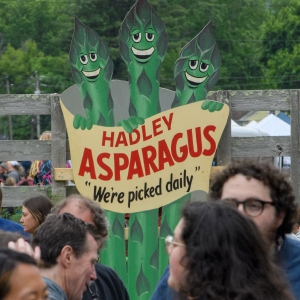Farming is in their blood: Brothers have kept Howes Family Farm humming through the years
| Published: 05-12-2021 7:18 PM |
CUMMINGTON — Since the 19th century, the Howes family has farmed land in town, a tradition that Kenneth “Trudge” Howes and Jerry Howes have continued for decades.
During this time the brothers have gone from dairy farming, to raising heifers to selling hay. Yet, even in the face of changes and challenges, the Howes’ have continued to work and make a living off of the land. “I keep busy,” Trudge Howes said. “We’re retired but we keep busy.”
Jerry Howes, 70, has lived in Cummington almost his entire life, although he lived for a time in Easthampton. Trudge Howes, meanwhile, has lived his entire life in the town.
“There’s not many of us left, I’ll tell you that,” said Trudge Howes, 68.
The Howes family first settled in Swift River in the 1850s, although the Howes Family Farm the brothers work has been in their family since only the 1950s.
“It’s kind of in your blood,” said Trudge, of farming.
Trudge gets his name from how he looked trudging out to the fields behind his father as a young man.
“I walk like an old man,” said Trudge, when asked if he still does the walk.
Article continues after...
Yesterday's Most Read Articles
He and Jerry worked together on the farm when they were younger and in the 1980s they bought their father out and took over.
“We’re still here,” said Jerry. “We haven’t killed each other.”
About a decade ago, the Howes’ chose to get out of the dairy farming business. The plan was to then sell heifers to dairy farms, but they ran into an issue.
“There wasn’t enough dairy farms looking for replacement animals,” said Trudge.
That caused the brothers to go into the hay business. And while the first few years of that was challenging, it’s now going well.
“We do about 15,000 bales of hay a year,” said Trudge.
In a typical year, Trudge said that they sell 11,000 to 12,000 bales of hay, and feed the rest to their beef cattle.
The brothers have about 40 head of beef cattle, and Trudge said that one of the reasons that they keep them is to stop their land from getting overtaken by woods.
“If nothing was here for the last 10 years it would be trees growing everywhere,” Trudge said.
Most of the cattle the Howes brothers have are Belted Galloways, although they’ve also bred them with Herefords and Red Angus.
Amidst the COVID-19 crisis, Trudge said that they actually had more demand for hay than they had supply — as last year also had a drought.
“It was good business for selling, it wasn’t good business for growing,” said Trudge.
He noted that in addition to customers with a large number of animals, they also have customers with only a few goats, sheep or horses as well.
“So many people are going back to having a few animals,” he said.
As for what the prognostication looks like for the hay business this year, Trudge said that it looks good if the weather warms up.
The brothers also have a firewood business, and they sell about 200 cords worth of wood a year.
“We’ve got a good relationship with our wood customers,” said Trudge, who also noted a good relationship with hay customers as well.
The brothers also noted that their family has been cutting wood since before they took over the farm.
“The two businesses aren’t going anywhere,” Trudge said. “It’s like being in the garbage business. It’s never going to end.”
The workforce on the farm is almost entirely the brothers, although for big haying jobs they’ll employ young people. One of Trudge’s sons also helps out sometimes.
Both Trudge and Jerry are married with three children each. And while none of their kids have become farmers, Trudge said that growing up with farming has helped instill a strong work ethic in their children.
Trudge said that the number of farms in Cummington has been reduced, and the few that remain maintain the agricultural land in the town.
“The land base is still maintained by the few of us who are still there,” he said.
As for when they intend to stop farming, Trudge had a frank answer: “Probably when one of us dies.”
Bera Dunau can be reached at bdunau@gazettenet.com.

 New HCC president reflects on journey: Timmons sees his own struggles and arc in students’ paths
New HCC president reflects on journey: Timmons sees his own struggles and arc in students’ paths South Hadley man fatally shot in attempted robbery
South Hadley man fatally shot in attempted robbery Historic murals restored at Victory Theatre in Holyoke
Historic murals restored at Victory Theatre in Holyoke Boards balk at limiting use of Hadley Town Common
Boards balk at limiting use of Hadley Town Common
